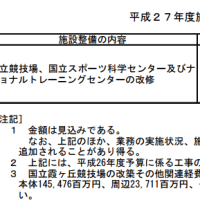何か知らんが、米国では「実家に戻って親と一緒に住む若者たち」こと『ブーメラン族(The Boomerang Generation)』が急増してるらしい。
・米で急増「ブーメラン族」(2012年5月28日 nhk.or.jp)
しかし、ブーメラン族って呼び名って、親の立場で考えると結構キツい皮肉な気がするけど・・・。
以下、2012年5月28日分 nhk.or.jp『米で急増「ブーメラン族」』を全文(略
---- 以下引用 ----
アメリカでは、かつて、大学卒業後は親元を離れて独立して生計を立てるのが当たり前とされてきましたが、最近では、経済の低迷から就職できないなどの理由で、実家に戻って親と一緒に住む若者たちが急増し、「ブーメラン族」と呼ばれて注目されています。
アメリカのシンクタンク「ピュー・リサーチ・センター」の調べによりますと、25歳から34歳の若者のうち[おまけ参照]、定職に就けずに実家に戻るいわゆる「ブーメラン族」が3人に1人の割合に上り、これは10年前から比べるとほぼ倍に増えているということです。
親元から独立することが当たり前とされてきたアメリカでは、これまで「ブーメラン族」となるのは恥ずかしいことと受け止められる傾向がありました。
しかし、このシンクタンクが行った意識調査では、「ブーメラン族」の80%近くが「今の生活を悪くは思っていない」と答え、最近の若者たちは、親元に戻ることにさほど抵抗を感じていなくなっていると分析しています。
こうした若者の中には、ブーメラン族となることを前向きに捉え、生きる力にしていこうという動きも出始めていて、ブーメラン族となったことで成長したみずからの経験をもとに小説を出版する女性や、親元に住みながら起業する人も出てきています。
かつてのように独立を急がず、家族の支えも受けながらみずからの生きる道を模索するのが、新しいアメリカ社会の潮流のようです。
---- 引用以上 ----
上の記事でネタにされてるのは、今年3月に公表された『The Boomerang Generation: Feeling OK about Living with Mom and Dad』というタイトルの調査結果。
↓問題の調査結果。
・The Boomerang Generation :Feeling OK about Living with Mom and Dad(2012年3月15日 pewsocialfriends.org)
この調査結果の解釈について問題になりそうなのは、NHK の記事で「10年前から比べるとほぼ倍」とされる部分。
ってことで、2012年3月15日分 pewsocialfriends.org『The Boomerang Generation~』内『The Rise of Multi-Generational Households』を(略
---- 以下引用 ----
(中略)
Young adults moving back in with their parents is part of a broader trend toward multi-generational living.
The number of Americans living in multi-generational households has been increasing steadily since 1980.
Demographic forces such as delayed marriage and a wave of immigration have contributed to the increase.
During the recent recession, which officially began in December 2007 and ended in June 2009, the number of Americans living in multi-generational households rose sharply.
A 2011 Pew Research Center report found that from 2007 to 2009 the increase in the number of Americans living in multi-generational households—from 46.5 million to 51.4 million—was the largest increase in modern history.
The 2011 report linked the rise in multi-generational living to the economy.
Unemployed adults, whose numbers grew substantially during the recession, are much more likely than those with jobs to be living in a multi-generational household.
The recession’s impact on personal finances also likely contributed to the increase.
From 2007 to 2009, median income went down and poverty rates went up.
Over this period, the share of Americans living in multi-generational households increased more among young adults than among other age groups.
By 2009, 21% of those ages 25 to 34 were living in multi-generational households, and the share had crept up even higher by the end of 2010 (to 21.6%).
Among the total population, 17.5% were living in multi-generational households in 2010, up from 15.2% in 2006.
(以下略)
---- 引用以上 ----
「昔に戻りつつある」といっても、厳密な意味での比較対象は Pew Research Center が行った調査結果ではない。
1940~2000 年と 2010年のデータは、米国国勢調査局(United States Census Bureau)が行った アメリカ地域社会調査(America Community Survey)の結果を元にしている。
↓は Pew~が公開していた、「他の世代と暮らしたい人達の割合に関する調査結果の推移」を示したグラフの画面メモ。

以下、このグラフを見て思ったことを少し・・・。
若い人達(25~34歳)に比べると、そうでない人達(というか上の世代の人達)が「他の世代(この場合若い世代という意味が強い)と住みたくない」と思う傾向が強いのがなんとも(苦笑)。
変な話、若い人達(25~34歳)の考えが上の世代の人達には「甘い」ものに見えて仕方がないのかもしれん。
無論、そうでない理由で「他の世代と暮らしたい」と思ってる 若い人達(25~34歳)もいるけど・・・。
つか、若い人達(25~34歳)が生まれた時期(1978~1987?)に同じ立場にいた人達が、親の立場になって子ども達と一緒に暮らしたくないなんて思ってるとすれば、色んな意味で怖いとしか。
なんせ、社会情勢をろくに踏まえないでそういう考えを持つに至ってるわけで・・・。
もっとも、よく考えたら、俺(現在3X歳)も、時間を待たずに上の世代になってしまうんだよな。
そうなった際、今回の調査に回答した上の世代の人達と似たような考え方をやらないって自信が無いのが本音だったりする。
歳をとるって怖いことなんだな・・・。
にしても。
今回の調査結果について、どこかの誰かが以下のようなことを言いそうで怖い・・・。
「日本の戦後における家族のあり方(核家族化)は間違ってたぞ!」
おまけ:Pew Research が行った調査の対象者・有効回答者人数・調査方法・誤差に関して述べてる部分を(略
・The Boomerang Generation :Feeling OK about Living with Mom and Dad(Page 3)(2012年3月15日 pewsocialfriends.org)
---- 以下引用 ----
(中略)
The general public survey is based on telephone interviews conducted Dec. 6-19, 2011, with a nationally representative sample of 2,048 adults ages 18 and older living in the continental United States, including an oversample of 346 adults ages 18 to 34.
A total of 769 interviews were completed with respondents contacted by landline telephone and 1,279 with those contacted on their cellular phone.
Data are weighted to produce a final sample that is representative of the general population of adults in the continental United States.
Survey interviews were conducted under the direction of Princeton Survey Research Associates International, in English and Spanish.
Margin of sampling error is plus or minus 2.9 percentage points for results based on the total sample and 4.4 percentage points for adults ages 18-34 at the 95% confidence level[95%信頼レベル].
(以下略)
---- 引用以上 ----
・米で急増「ブーメラン族」(2012年5月28日 nhk.or.jp)
しかし、ブーメラン族って呼び名って、親の立場で考えると結構キツい皮肉な気がするけど・・・。
以下、2012年5月28日分 nhk.or.jp『米で急増「ブーメラン族」』を全文(略
---- 以下引用 ----
アメリカでは、かつて、大学卒業後は親元を離れて独立して生計を立てるのが当たり前とされてきましたが、最近では、経済の低迷から就職できないなどの理由で、実家に戻って親と一緒に住む若者たちが急増し、「ブーメラン族」と呼ばれて注目されています。
アメリカのシンクタンク「ピュー・リサーチ・センター」の調べによりますと、25歳から34歳の若者のうち[おまけ参照]、定職に就けずに実家に戻るいわゆる「ブーメラン族」が3人に1人の割合に上り、これは10年前から比べるとほぼ倍に増えているということです。
親元から独立することが当たり前とされてきたアメリカでは、これまで「ブーメラン族」となるのは恥ずかしいことと受け止められる傾向がありました。
しかし、このシンクタンクが行った意識調査では、「ブーメラン族」の80%近くが「今の生活を悪くは思っていない」と答え、最近の若者たちは、親元に戻ることにさほど抵抗を感じていなくなっていると分析しています。
こうした若者の中には、ブーメラン族となることを前向きに捉え、生きる力にしていこうという動きも出始めていて、ブーメラン族となったことで成長したみずからの経験をもとに小説を出版する女性や、親元に住みながら起業する人も出てきています。
かつてのように独立を急がず、家族の支えも受けながらみずからの生きる道を模索するのが、新しいアメリカ社会の潮流のようです。
---- 引用以上 ----
上の記事でネタにされてるのは、今年3月に公表された『The Boomerang Generation: Feeling OK about Living with Mom and Dad』というタイトルの調査結果。
↓問題の調査結果。
・The Boomerang Generation :Feeling OK about Living with Mom and Dad(2012年3月15日 pewsocialfriends.org)
この調査結果の解釈について問題になりそうなのは、NHK の記事で「10年前から比べるとほぼ倍」とされる部分。
ってことで、2012年3月15日分 pewsocialfriends.org『The Boomerang Generation~』内『The Rise of Multi-Generational Households』を(略
---- 以下引用 ----
(中略)
Young adults moving back in with their parents is part of a broader trend toward multi-generational living.
The number of Americans living in multi-generational households has been increasing steadily since 1980.
Demographic forces such as delayed marriage and a wave of immigration have contributed to the increase.
During the recent recession, which officially began in December 2007 and ended in June 2009, the number of Americans living in multi-generational households rose sharply.
A 2011 Pew Research Center report found that from 2007 to 2009 the increase in the number of Americans living in multi-generational households—from 46.5 million to 51.4 million—was the largest increase in modern history.
The 2011 report linked the rise in multi-generational living to the economy.
Unemployed adults, whose numbers grew substantially during the recession, are much more likely than those with jobs to be living in a multi-generational household.
The recession’s impact on personal finances also likely contributed to the increase.
From 2007 to 2009, median income went down and poverty rates went up.
Over this period, the share of Americans living in multi-generational households increased more among young adults than among other age groups.
By 2009, 21% of those ages 25 to 34 were living in multi-generational households, and the share had crept up even higher by the end of 2010 (to 21.6%).
Among the total population, 17.5% were living in multi-generational households in 2010, up from 15.2% in 2006.
(以下略)
---- 引用以上 ----
「昔に戻りつつある」といっても、厳密な意味での比較対象は Pew Research Center が行った調査結果ではない。
1940~2000 年と 2010年のデータは、米国国勢調査局(United States Census Bureau)が行った アメリカ地域社会調査(America Community Survey)の結果を元にしている。
↓は Pew~が公開していた、「他の世代と暮らしたい人達の割合に関する調査結果の推移」を示したグラフの画面メモ。

以下、このグラフを見て思ったことを少し・・・。
若い人達(25~34歳)に比べると、そうでない人達(というか上の世代の人達)が「他の世代(この場合若い世代という意味が強い)と住みたくない」と思う傾向が強いのがなんとも(苦笑)。
変な話、若い人達(25~34歳)の考えが上の世代の人達には「甘い」ものに見えて仕方がないのかもしれん。
無論、そうでない理由で「他の世代と暮らしたい」と思ってる 若い人達(25~34歳)もいるけど・・・。
つか、若い人達(25~34歳)が生まれた時期(1978~1987?)に同じ立場にいた人達が、親の立場になって子ども達と一緒に暮らしたくないなんて思ってるとすれば、色んな意味で怖いとしか。
なんせ、社会情勢をろくに踏まえないでそういう考えを持つに至ってるわけで・・・。
もっとも、よく考えたら、俺(現在3X歳)も、時間を待たずに上の世代になってしまうんだよな。
そうなった際、今回の調査に回答した上の世代の人達と似たような考え方をやらないって自信が無いのが本音だったりする。
歳をとるって怖いことなんだな・・・。
にしても。
今回の調査結果について、どこかの誰かが以下のようなことを言いそうで怖い・・・。
「日本の戦後における家族のあり方(核家族化)は間違ってたぞ!」
おまけ:Pew Research が行った調査の対象者・有効回答者人数・調査方法・誤差に関して述べてる部分を(略
・The Boomerang Generation :Feeling OK about Living with Mom and Dad(Page 3)(2012年3月15日 pewsocialfriends.org)
---- 以下引用 ----
(中略)
The general public survey is based on telephone interviews conducted Dec. 6-19, 2011, with a nationally representative sample of 2,048 adults ages 18 and older living in the continental United States, including an oversample of 346 adults ages 18 to 34.
A total of 769 interviews were completed with respondents contacted by landline telephone and 1,279 with those contacted on their cellular phone.
Data are weighted to produce a final sample that is representative of the general population of adults in the continental United States.
Survey interviews were conducted under the direction of Princeton Survey Research Associates International, in English and Spanish.
Margin of sampling error is plus or minus 2.9 percentage points for results based on the total sample and 4.4 percentage points for adults ages 18-34 at the 95% confidence level[95%信頼レベル].
(以下略)
---- 引用以上 ----



















